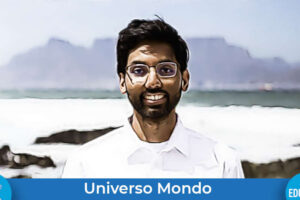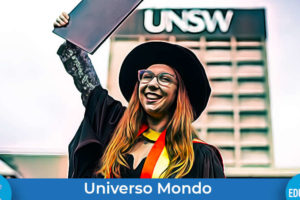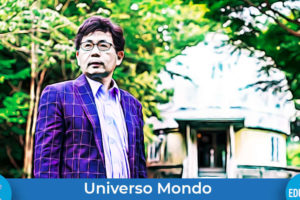Hello and welcome back on the pages of Universe World, which is now officially a quarterly column. For the last interview of 2025, we visit the United States with a very special guest, Mike Simmons, who has been an amateur astronomer and outreach leader for over fifty years and is currently CEO of Astronomy for Equity, a non-governmental organization he founded to inspire, educate and provide hope for unserved communities through astronomy.

Hi Mike, it’s such a pleasure to have you on this column: we are eager to hear about your new role and the path that led you there!
I’m currently leading Astronomy for Equity, a new NGO I founded recently to support those using astronomy to improve lives and societies of marginalized and isolated communities around the world. But while astronomy has been a passion as long as I can remember, my professional career was in medical research. I stayed active in astronomy, though, leading programs and organizations and sometimes creating them.
Wow, that’s quite a spread, from medical research to leading global efforts in astronomy outreach. What happened?
It’s been a winding path to where I am now but that’s how life works. One thing leads to another. But a big change took place in one step. I had been leading and creating astronomy programs locally for 25 years when I visited Iran for the total solar eclipse in 1999 and found a young, enthusiastic, and vibrant astronomy community. It was one of many surprises we experienced in Iran, which was nothing at all like the country and culture we’d been led to believe (how I ended up in Iran for an eclipse is another chain of events going way back). The amateur astronomers were unable to get resources they need, like telescopes, but when I gave presentations and wrote magazine articles on astronomy in Iran everyone wanted to connect with them and help, though sanctions prevented sending them anything big. I was also in contact with amateur astronomers in Iraqi Kurdistan and visited them as well, taking over 100 kg of astronomy equipment donated by generous amateur astronomers in my area of southern California.
This led to founding Astronomers Without Borders with a mission of connecting people in different countries and cultures through astronomy. The goal was for people to learn about each other, as I had in visiting places most Americans don’t go. The internet was young then but now it’s normal to be in contact with people from around the world and there are other organizations like the International Astronomical Union doing great work. I had learned a great deal about how astronomy is used for good by so many organizations worldwide that I started Astronomy for Equity to take support these programs, taking advantage of the knowledge and network I had gained.
What are Astronomy for Equity’s main activities?
Astronomy for Equity has four main programs that I don’t think anyone else is doing.
Bright Futures had more than a million new, unused solar eclipse glasses donated to us after the 2024 solar eclipse in the US. I’ve distributed glasses to many countries that aren’t able to obtain them before, which is most of the world, but they are mostly used once and then set aside. We have developed an educational program based on the Sun and sunlight with lessons for the recipient organizations to use in places where there are no facilities or trained teachers for science education. The Sun and sunlight are available to everyone and the lessons introduce science concepts and will go into all the related STEM fields like physics and chemistry but also climate change, art and colors, biology, anything really.
Our Big Impact Astronomy podcast features an interview with someone I know doing amazing work through astronomy, mostly in countries most people know very little about it, like Ethiopia, Algeria, or Pakistan.
We are relaunching a community hub for Astronomy for the blind, something most astronomers have never heard of. There are people around the world doing this but there is no connection and sharing between them and very few astronomy outreach groups know this is something they can do. Astronomy outreach is all about sharing our passion and the wonders of the cosmos with others but people lacking vision are usually left out. There’s no need for that since there are a lot of resources for astronomy education using touch and sound, and a lot of people with experience doing it. So we’re bringing people together, with experienced people sharing what they’ve learned and created and outreach groups anywhere in the world learning how to include blind and low vision audiences in their existing outreach programs. After all, we are all blind to most of the astronomy data collected from terrestrial and space telescopes from radio wavelengths to X-rays. We’re just used to making pictures from the data but in fact everyone can learn from 3-D models.
I’ve run many crowdfunding campaigns for outreach groups in developing countries that need a critical resource, usually a telescope. They have the people and other resources so we provide the missing pieces that make a huge difference. Astronomy for Equity raised funds to send telescopes to astronomy clubs in five middle schools in Libya that were created by a national organization. We also sent telescopes to astronomy students in Ukraine that requested them through an collaborating organization that has been providing laptops. They wanted to take advantage of the dark skies over their cities caused by the frequent power outages. I took more telescopes when I visited the schools in Ukraine last November.

The Big Impact Astronomy podcast sounds very much up my alley. Different medium but a similar scope as the interviews I run here on Universe World…
Well, it wasn’t my idea and I didn’t know how to do a podcast but I embraced it because it was such a great idea. There are several reasons I like doing this podcast. The people I know around the world who are doing great work with astronomy are unknown, often even in their own countries. The world needs to know about them and understand why we do astronomy, and I’m going to use these podcast episodes to encourage people to help them.
We all get questions about why we look up when there is so much to do down here on Earth. This answers it – astronomy inspires us, shows us our place in the Universe, but is also used to introduce STEM education where the stars are the only science “laboratory” schools have. It shows a path to science and is used to encourage excluded groups like girls in patriarchal cultures who don’t even know they can go into science if they want to. Just looking through a telescope for the first time can spark a life-long interest in science and change someone’s path. The podcast is also about people in countries and cultures unknown to people in western countries, often in the most remote villages, so I hope it will be of interest to the general population as well.
How is the podcast being received?
We haven’t advertised it yet so we haven’t built a big audience. We’re about to launch a new website and start social media and publicity campaigns and we’ll be talking about it a lot and looking for sponsors to allow us to continue it on a regular basis. The feedback I’ve had so far has been really great, though.
A classic question in this column is to describe the state of astronomy and space science in the interviewee’s country for our international readers. You are based in the United States of America, which has a long tradition in astronomy and even more so in space science, so I wasn’t going to ask you about that. This year, however, the political climate in the US is not so favorable to basic research, including these topics, with massive budget cuts on the horizon and a dire climate for anyone who’s involved in Diversity, Equity and Inclusion initiatives. How is the situation on the ground?
The US has a long tradition of important science for more than a century, of course. There are many areas in which the US has led the world, including astronomy since the early 20th century. The recent budget cuts along with an anti-science viewpoint by the current federal government now threatens all that. No one is yet certain how it will end up, though. That uncertainty is itself very harmful. Young scientists are sometimes choosing to move to other more welcoming countries and researchers and students from other countries are more often decide not to come here or are unable to get a visa.
I don’t get the sense that it’s just basic science, which is often misunderstood and targetted by non-scientist politicians, that is being affected the most. Even funding for important research in health sciences is being cut. Anything perceived as aiding diversity, equity, and inclusion is being destroyed. There is also dangerous overreaction where work recognizing important historical figures are being attacked if they happened to be women or people of color who contributed to our country in ways similar to white men. Whether or not this will turn around in a few years or we will lose decades of progress remains an open question.

Scary times, indeed. In this context, what would you say are the major challenges for science communicators and educators in the US today?
Educators in particular are under attack in some areas if they are continuing to teach the equality, unity, and opportunity this country is meant to represent. The various states are very different in that regard, though. It’s not as much of a problem in my state of California as it is in some more conservative states. The universities that are considered to have liberal values are under enormous pressure with threats of budget cuts, an illegal tactic being used to control their policies. The budget threats come from the executive branch, not Congress that actually allocates funds but is not exerting its own authority to push back. I think science communication is mostly unaffected other than by attacks by individuals as it becomes more acceptable to complain about work espousing equitable and fair treatment for all.
And how do these differ from the challenges you encounter from your travels and projects around the world?
I’m used to visiting countries that have repressive governments or very conservative societies. The US seems to be regressing in some important ways to be more like those societies. At first they appear the same but there are always important differences from what you’d expect. The women in Iran, for example, are far more free to do what they want despite the image in the West that they are repressed as much as in some conservative Muslim countries. Most importantly, the young people I work with in almost every country are very progressive and see the value of all groups having equal opportunities. That often puts them at odds with large segments of society and even the government but they are persistent. I see great changes coming in those societies but these are generational changes that take time.
In your view, what’s the greatest contribution astronomy can bring to society?
There are a lot of ways that astronomy benefits society. Basic research leads to discoveries in the vast “laboratory” of the cosmos but very few in modern society are aware of how those discoveries impact their daily lives. For society in general, I think the perspective astronomy gives us is most important. To understand that we are on a small planet traveling through space together – a Pale Blue Dot as Carl Sagan put it and as fellow passengers on Spaceship Earth as Buckminster Fuller said – is critical to our understanding that all our lives are intertwined.
The truly global nature of society has reached a point that this dysfunctional family of humanity must solve its problems together, for the betterment of all. Our short excursions from Earth help but it is the vastness of the Universe and our lonely place in it that has the greatest impact. What Astronomy for Equity does is another benefit, using the cosmos as the natural laboratory and learning space for those in developing countries, but unfortunately our reach is too small to have the impact it should.

What are the most exciting and most difficult parts in your job?
It’s always exciting to create something new and unique! I’ve done this throughout my life, always wanting to do something that others aren’t doing, solving problems that others aren’t addressing. But starting new things is always hard. Few people recognize the value at first and garnering support – especially raising funding – is difficult at first. It’s the entrepreneur’s conundrum; you need to show results to get funding but you need funding to get started and get results. Fortunately, I’ve done this many times and I’m known for being successful but fundraising is always the part I like the least.
Are there any authors, books, people or special events that influenced you along your journey?
I was a voracious reader of science fiction growing up and those stories always had an effect on me. They were, to me, a way to dream and imagine circumstances beyond what we experience on Earth.
I can’t think of any particular authors or individuals that influenced me more than others, though. I’ve learned something from so many people and experiences throughout my life.
The 1999 trip to Iran was one that did change my life as I turned from creating and leading local programs and organizations to connecting people in very different countries. It wasn’t just that my work became international but that it involved peacemaking between the citizens of countries where the governments are adversaries. It was really eye-opening to see how much the people of Iran loved Americans and my country. Neither of us liked the other’s government. So bringing people together to see each other as fellow passengers on Spaceship Earth became a new mission. Astronomy has been the perfect vehicle for that since we all share the same sky and have the same passion understanding the cosmos. How can we fight about this one little planet?




Add Comment